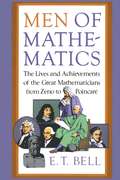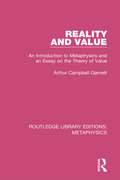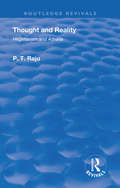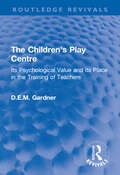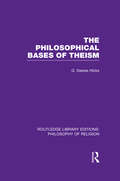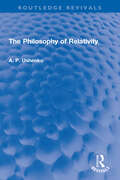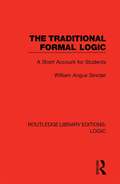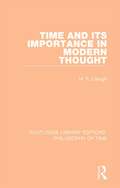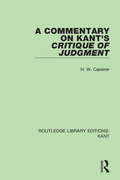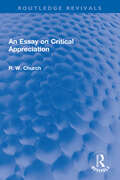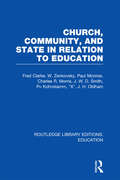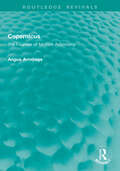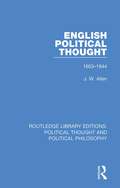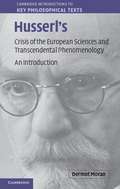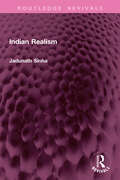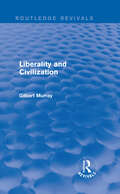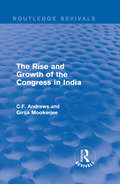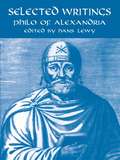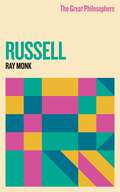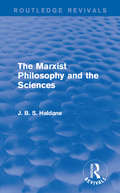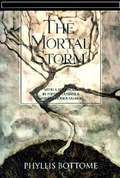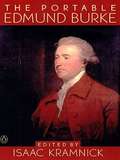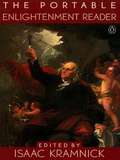- Table View
- List View
Men of Mathematics
by E. T. BellHere is the classic, much-read introduction to the craft and history of mathematics by E.T. Bell, a leading figure in mathematics in America for half a century. Men of Mathematics accessibly explains the major mathematics, from the geometry of the Greeks through Newton's calculus and on to the laws of probability, symbolic logic, and the fourth dimension. In addition, the book goes beyond pure mathematics to present a series of engrossing biographies of the great mathematicians -- an extraordinary number of whom lived bizarre or unusual lives. Finally, Men of Mathematics is also a history of ideas, tracing the majestic development of mathematical thought from ancient times to the twentieth century. This enduring work's clear, often humorous way of dealing with complex ideas makes it an ideal book for the non-mathematician.
Reality and Value: An Introduction to Metaphysics and an Essay on the Theory of Value (Routledge Library Editions: Metaphysics)
by Arthur Campbell GarnettOriginally published in 1937. This book addresses the importance of the theory of values that rests on a general metaphysical understanding founded on a comprehensive view of all aspects of the world. The author speaks against the absolutist theories with a realistic one encompassing a theory of space and time and considering value as an object of immediate intuition. These great philosophical questions feed into discussions of the philosophy of religion and of science. Garnett distinguishes between spiritual and other values on the ground that the spiritual values are not subjective to satiety, while other values are. He contends that our knowledge of mind is as direct and reliable as our knowledge of the physical world. This is an important early book by an influential 20th Century thinker.
Revival: Thought and Reality - Hegelianism and Advaita (1937)
by Poolla Tirupati RajuThis work is a contribution to certain aspects of idealistic philosophy. It is a comparative study, yet it is not a comparison for the sake of comparison. This book examines the supra-rational Absolutism of the West developed under the Hegelian influence, and in the light of the criticisms shows the peculiar character of the Advaita Vedanta of Sankara. It is therefore not a mere exposition, but a criticism and construction. The discussions are not cosmological, but epistemological and metaphysical, approached from the side of logic. The work may also be viewed as a reorientation of Sankara's system. It places Sankara’s philosophy in line with the idealistic philosophies of the West, so that we can understand the peculiarities of the former in terms of the latter. It thus discovers or brings into clearer light the guiding principle of Sankara’s thought. It brings out the full significance of the principles of non-contradiction applied by Sankara as a test of truth and reality, and shows its difference from the same principle as understood by Hegel and the Hegelians. The aim of this work is to attempt at laying the metaphysical foundation of the logic of supra-rational Absolutism, the interpretation of Advaita is based mostly on polemical works.
The Children's Play Centre: Its Psychological Value and its Place in the Training of Teachers (Routledge Revivals)
by D.E.M. GardnerFirst published in 1937, The Children’s Play Centre is an account of Gardner’s Play Centre and her work in assessing its value in the education of children and the training of teachers. The book puts forward the value of play in the development of children and provides a detailed report of Gardner’s experiment. It also explores the significance of the Play Centre to the technique of training students. It will have lasting relevance for those interested in the history of education and the psychology of education.
The Philosophical Bases of Theism (Routledge Library Editions: Philosophy of Religion)
by George Dawes HicksExcellently organised and written, this is a thorough examination of how philosophy interacts with religion. The chapters were originally presented as the Hibbert Lectures in 1931 at University College London and the University of Manchester. The texts are expanded and elaborated to present a cohesive text, first published in 1937. Exploring free rational thinking, the book encourages reflection on the principals on which religion rests and addresses themes such as knowledge and experience, evolution, positivism, mystical experience, divine immanence, beauty and morality.
The Philosophy of Relativity (Routledge Revivals)
by A. P. UshenkoFirst published in 1937, The Philosophy of Relativity contains an exposition of Einstein, a step-by step deduction of the main equations of both the special and general theories of relativity. This book sets out to expound an original theory of events, change and space-time, and to offer a new explanation of perception. But in order to ramify his belief in the objective reality of space and time, the author digresses into problems of general interest such as cognitive significance of art and Zeno’s paradoxes. He also defends his theory in an appraisal of the fashionable views of logical positivism and pragmatism. This book is a must read for scholars and researchers of philosophy of science and philosophy in general.
The Traditional Formal Logic: A Short Account for Students (Routledge Library Editions: Logic)
by William Angus SinclairOriginally published in 1937. A short account of the traditional logic, intended to provide the student with the fundamentals necessary for the specialized study. Suitable for working through individualy, it will provide sufficient knowledge of the elements of the subject to understand materials on more advanced and specialized topics. This is an interesting historic perspective on this area of philosophy and mathematics.
Time and its Importance in Modern Thought (Routledge Library Editions: Philosophy of Time #1)
by M. F. CleughOriginally published in 1937. This book is a classic work on the philosophy of time, looking at the pshychology, physics and logic of time before investigating the views of Kant, Bergson, Alexander, McTaggart and Dunne. The second half of the book contains more indepth consideration of prediction, the concepts of past and future, and reality.
A Commentary on Kant's Critique of Judgement (Routledge Library Editions: Kant)
by H. W. CassirerThis book expounds Kant's Critique of Judgement by interpreting all the details in the light of what Kant himself declares to be his fundamental problem. Providing an excellent introduction to Kant's third critique, it will be of interest to students of philosophy.
An Essay on Critical Appreciation (Routledge Revivals)
by Ralph W. Church dec'dFirst published in 1938, An Essay on Critical Appreciation aims to provide a language suited for the explication on beauty. This explication is not based merely on emotion but is motivated by contemplation and discrimination. By virtue of being rendered in a discourse, an appreciation can claim to be critical or discriminating and ‘beauty’ can be said to have characteristics. The search of such a language takes the author through the contemplation on the meaning of ‘beauty’, entertaining contrary views, and reaching at an understanding of the aesthetic situation. This book will be of interest to students of English literature, philosophy and art.
Church, Community and State in Relation to Education: Towards a Theory of School Organization (Routledge Library Editions: Education)
by Fred ClarkeThis volume was originally prepared for the World Conference on Church, Community and State held in Oxford in 1937. Its aim was to understand the nature of the vital conflict between the Christian faith and the secular tendencies of the early twentieth century, particularly in relation to education. The book also analyses the responsibilities of the Church in this struggle.
Copernicus: The Founder of Modern Astronomy (Routledge Revivals)
by Angus ArmitageCopernicus (1938) presents an account of the astronomer Copernicus, and of the historic book in which he laid the foundations of the heliocentric theory of the planetary motions. The book is of great interest to students of the history of astronomy, and those interested in Copernicus as one of the makers of modern thought.
English Political Thought: 1603-1644 (Routledge Library Editions: Political Thought and Political Philosophy #1)
by J. W. AllenFirst published in 1938. A study of the political doctrines and events which led to a hardening of lines between the Royalists and the Parliamentarians. "From the March of 1604, when James I met his first Parliament to the assembly of the Long Parliament in November 1640, there was going on a conflict between irreconcilable views concerning the constitution of government in England. It was concerned with what had been and with what was and, necessarily, with what should be." By 1640 the question soon would be "how stable government could ever again be established . . . But the confusion, if it produced little else of value, produced a ferment of thought." And this ferment has had an incalculable effect on the centuries which have followed. Among the many topics discussed, on the basis of firm knowledge and with reasonableness, are the King and the nature of his claim, the parliamentary opposition and its conceptions and the possibility of compromise, the approach to Toleration, Puritanism and the Laudian Church, and the final collapse of government.
Husserl'S Crisis of the European Sciences and Transcendental Phenomenology
by Dermot MoranThe Crisis of the European Sciences is Husserl's last and most influential book, written in Nazi Germany where he was discriminated against as a Jew. It incisively identifies the urgent moral and existential crises of the age and defends the relevance of philosophy at a time of both scientific progress and political barbarism. It is also a response to Heidegger, offering Husserl's own approach to the problems of human finitude, history and culture. The Crisis introduces Husserl's influential notion of the 'life-world' – the pre-given, familiar environment that includes both 'nature' and 'culture' – and offers the best introduction to his phenomenology as both method and philosophy. Dermot Moran's rich and accessible introduction to the Crisis explains its intellectual and political context, its philosophical motivations and the themes that characterize it. His book will be invaluable for students and scholars of Husserl's work and of phenomenology in general.
Indian Realism (Routledge Revivals)
by Jadunath SinhaFirst published in 1938, Indian Realism is a reconstruction of the Yogacara Vijnanavada (Subjective Idealism) and an exhaustive criticism of it by the different schools of Indian realism. The exposition of the doctrine is based on the works of Santaraksita and Kamalasila and the critics of Vijnanavada. Generally each thinker’s exposition and criticism have been given separately. Profound thinkers like Kumarila, Jayanta Bhatta, Vacaspatimisra, Sridhara and Sankara have been included. There is a criticism of Vedanta by the Buddhist realists and the different schools of the Vedanta. Incidentally, the Yogacara subjectivism has been compared with the idealism of Berkeley and the sensationism of Hume. Parallel arguments of many contemporary realists, too, have been quoted to show that philosophical genius of a particular type is apt to move in the same groove, irrespective of its location. This book will be of interest to students of philosophy, religion and South Asian studies.
Liberality and Civilization: Lectures Given At The Invitation Of The Hibbert Trustees In The Universities Of Bristol, Glasgow And Birmingham (Routledge Revivals)
by Gilbert MurrayFirst published in 1938, these lectures argue that liberality is the foundation of civilization. According to Gilbert Murray, civilization provides the surplus of security, leisure and wealth that makes liberality possible; a failure of liberality is the surest test of the failure of a civilization. This is a fascinating reissue that will be of great value to students with an interest in political philosophy and the foundations of liberal society.
Routledge Revivals (1938): The Rise And Growth Of The Congress In India (1938)
by C.F. Andrews Girija MookerjeeFirst published in 1938, this book aims to provide a history of the rise and growth of the Indian National Congress for the general reader, covering the period from its foundation in 1885 until the beginning of the non-co-operation movement in 1920. It was intended to extend the official history of the Congress by Pattabhi Sitarammayya by making it more accessible to western readers while also giving more space to the religious and social forces in Indian history during the nineteenth century which led to the birth of the congress. It also looks at forerunner organisations like The British Indian Association before examining the history and evolution of the congress in several phases.
Selected Writings
by Philo Hans LewyThese selections illuminate Philo's crucial role in assimilating Greek philosophy to biblical religion and accommodating Jewish belief to Greek thought. Topics include the knowledge of God; the mystic way; the soul and her God; man's humility, hope, faith, and joy; vices and virtues; and Israel and the nations.
The Great Philosophers: Russell
by Ray MonkBertrand Russell 1872-1970Bertrand Russell discovered mathematics at the age of eleven. It was, he recalled, a transporting experience: 'as dazzling as first love.'From that moment on, he would pursue his passion with undying devotion and all but erotic fervour. Mathematics might succeed, he felt, where philosophy had failed, reducing thought to its purest form, and freeing knowledge from doubt and contradiction.And so, for a time, it seemed. Russell's mathematical investigations effortlessly resolved at a stroke some of philosophy's most intractable problems. Yet if mathematics could be a liberating mistress, she was an unreliable one...Opening up the work of one of our age's undisputed giants, Ray Monk's exhilaratingly clear, readable guide tells a compelling human tale too: a moving story of love and loss, of ecstatic triumph and deep disillusion.
The Great Philosophers: Russell (GREAT PHILOSOPHERS)
by Ray MonkBertrand Russell 1872-1970Bertrand Russell discovered mathematics at the age of eleven. It was, he recalled, a transporting experience: 'as dazzling as first love.'From that moment on, he would pursue his passion with undying devotion and all but erotic fervour. Mathematics might succeed, he felt, where philosophy had failed, reducing thought to its purest form, and freeing knowledge from doubt and contradiction.And so, for a time, it seemed. Russell's mathematical investigations effortlessly resolved at a stroke some of philosophy's most intractable problems. Yet if mathematics could be a liberating mistress, she was an unreliable one...Opening up the work of one of our age's undisputed giants, Ray Monk's exhilaratingly clear, readable guide tells a compelling human tale too: a moving story of love and loss, of ecstatic triumph and deep disillusion.
The Marxist Philosophy and the Sciences (Routledge Revivals)
by J. B. HaldaneThis book, first published in 1938, is based upon the Muirhead lectures on political philosophy delivered in the University of Birmingham in January and February of 1938. This title was intended to be of interest to students and scientific workers in the belief that Marxism will prove valuable to them in their scientific work, as well as to a wider audience.
The Mortal Storm
by Phyllis BottomeFreya Roth has everything a young woman could want. Her father is a kind and brilliant professor, her mother loving and beautiful, and there are three fine brothers. She is studying to be a doctor, and her suitro is rich and handsome. Then Hitler comes into power. Her older half-brothers turn against their stepfather, who is Jewish, and both are members of the Nazi Party. At the same time, Freya meets a young Communist peasant with whom she falls in love. Personal and political differences destroy the family's once uncloded happiness, and danger grows for Freya. This book, written in 1938, foreshadowed the horrors of years to come. It was also a feminist statement, made in an entertaining way. A film of this story with James Steward and Margaret Sullivan radically changed the plot although some of the seeds that must have attracted the producers are still there. However, the book is much less conventional and more forthright. "The Mortal Storm" is a poignant, exciting and thought-provoking book.
The Portable Edmund Burke
by Edmund Burke Isaac KramnickThe intellectual wellspring of modern political conservatism, Edmund Burke is also considered a significant figure in aesthetic theory and cultural studies. As a member of the House of Commons during the late eighteenth century, Burke shook Parliament with his powerful defense of the American Revolution and the rights of persecuted Catholics in England and Ireland; his indictment of the English rape of the Indian subcontinent; and, most famously, his denouncement of English Jacobin sympathizers during the French Revolution. The Portable Edmund Burke is the fullest one- volume survey of Burke's thought, with sections devoted to his writings on history and culture, politics and society, the American Revolution, Ireland, colonialism and India, and the French Revolution. This volume also includes excerpts from his letters and an informative Introduction surveying Burke's life, ideas, and his reception and influence in the nineteenth and twentieth centuries. .
The Portable Enlightenment Reader
by Various Isaac KramnickThe Age of Enlightenment of the eighteenth century, also called the Age of Reason, was so named for an exultant intellectual movement that shook the foundations of Western civilization. In championing radical ideas such as individual liberty and an empirical appraisal of the universe through rational inquiry and natural experience, Enlightenment philosophers in Europe and America planted the seeds for modern liberalism, cultural humanism, science and technology, and laissez-faire capitalism. This volume brings together the era's classic works, with more than a hundred selections from a broad range of sources--including works by Kant, Diderot, Voltaire, Newton, Rousseau, Locke, Franklin, Jefferson, Madison, and Paine--that demonstrate the pervasive impact of Enlightenment views on philosophy and epistemology as well as on political, social, and economic institutions. Included are seminal discourses on science and religion, on the social contract, on the equality (and inequality) of the sexes and the races, and on economics and markets, as well as homages to nature and sexual pleasure, and poetry and opera librettos that embody the movement's social ideals.
The Portable Enlightenment Reader
by Various Isaac KramnickThe Age of Enlightenment of the 18th century, also called the Age of Reason, was so named for an intellectual movement that shook the foundations of Western civilization. In championing radical ideas such as individual liberty and an empirical appraisal of the universe through rational inquiry and natural experience, Enlightenment philosophers in Europe and America planted the seeds for modern liberalism, cultural humanism, science and technology, and laissez-faire Capitalism This volume brings together works from this era, with more than 100 selections from a range of sources. It includes examples by Kant, Diderot, Voltaire, Newton, Rousseau, Locke, Franklin, Jefferson, Madison, and Paine that demonstrate the pervasive impact of Enlightenment views on philosophy and epistemology as well as on political, social, and economic institutions.
